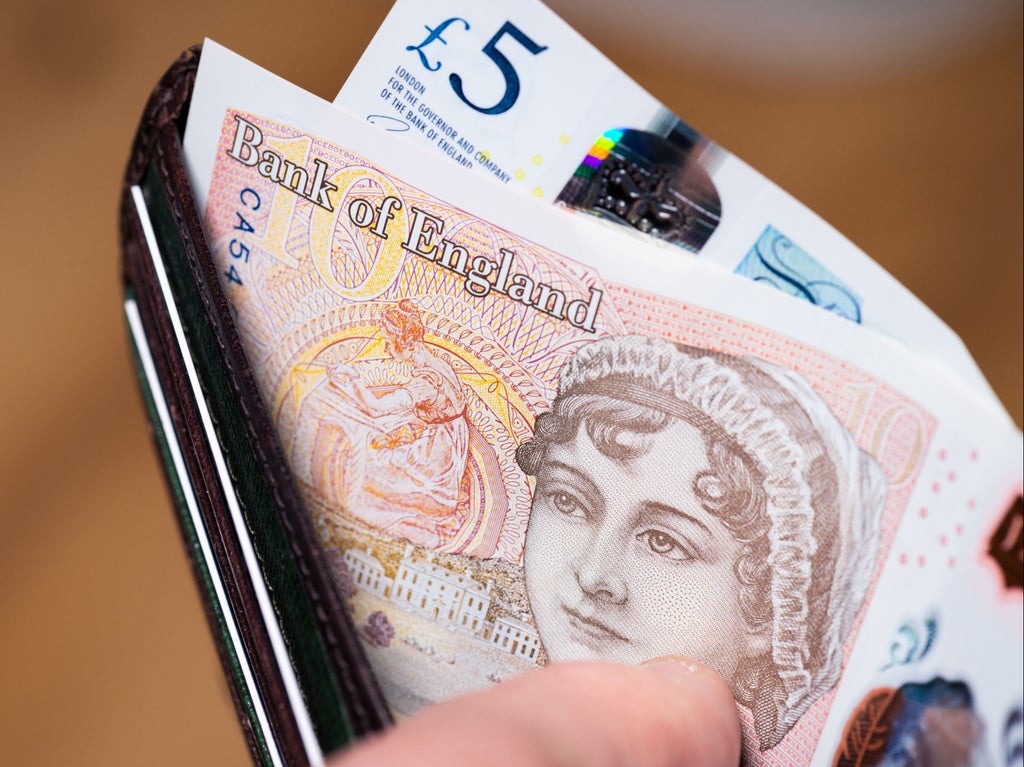
The UK economy shrank in March, as soaring living costs and the war in Ukraine hindered recovery from the pandemic.
Experts warned that a plunge in household incomes meant trouble ahead for the economy and that the risk of a recession was growing.
Official figures show the economy grew by 0.8 per cent between January and March, down from growth of 1.3 per cent in the previous three months. However, GDP fell by 0.1 per cent in March, leaving it just 0.7 per cent above pre-pandemic levels, the Office for National Statistics (ONS) said.
Trade data released on Thursday showed exports fell 3 per cent in real terms between March and February and remain 14.6 per cent below average 2018 levels – the last year before major upheavals resulting from Brexit.
The figures will act as another economic warning sign for chancellor Rishi Sunak after separate data showed retail sales had slowed and consumer confidence plunged in April.
Real disposable incomes are forecast to fall by £1,200 per household this year in the biggest fall in living standards since comparable records began in 1956.
Despite the dire outlook, the chancellor has so far resisted calls to provide further financial support for people struggling to cover the cost of rising bills and higher prices for essential goods including food.
Darren Morgan, director of economic statistics at the ONS, said growth in the latest three months was the lowest for a year.
He added: “Our latest monthly estimates show GDP (gross domestic product) fell a little in March, with drops in both services and in production.”
Economic growth in the first quarter of the year was driven by hospitality, transport and travel agencies as consumers returned to pre-pandemic shopping habits. Construction also saw a strong month, thanks partly to repair work after storms in February.
Yael Selfin, chief economist at KPMG UK, said the outlook for Britain’s economy looked increasingly fraught, with the risk of a recession increasing.
“The squeeze on consumers has tightened from the second quarter of this year, with the increase in energy tariffs and the higher cost of food and other commodities arising from the conflict in Ukraine, pushing up the cost of living.
“At the same time, tighter financial conditions and rising interest rates have seen the cost of borrowing increase.”
The Bank of England hiked its interest rate to 1 per cent last week in an effort to tame a surge in inflation, which is forecast to peak at 10.25 per cent later this year. The sharp rise in prices means falling real incomes for millions of people as pay rises fail to keep pace.
Mr Sunak conceded that these were “anxious times” but said the UK economy was growing faster than the US, Germany and Italy.
“Our recovery is being disrupted by Putin’s barbaric invasion of Ukraine and other global challenges, but we are continuing to help people where we can,” he added.
“Growth is the best way to help families in the longer-term, so as well as easing immediate pressures on households and businesses, we are investing in capital, people and ideas to boost living standards in the future.”
Economists have warned the chancellor that his recent tax rises and continued failure to provide more financial support risks choking off the economic recovery and tipping the country into recession.
The Bank of England forecasts that the UK economy will barely be bigger in 2025 than it was in 2020. It expects the economy to shrink in the final quarter of this year when households are hit with another huge rise in energy bills, leaving them with less money to spend elsewhere.
Ed Monk, associate director at Fidelity International, said the latest data indicated that the economy could tip into recession earlier than the Bank has forecasted.
“The UK faces a serious fight to avoid recession this year,” he said. “Soaring energy, fuel and food prices continue to eat into household budgets. And while some are already having to choose between basic necessities, this is unlikely to be the end of the squeeze.”
Shadow levelling up secretary Lisa Nandy said money is being “sucked out of communities” and this is playing out in the slower growth seen in Thursday's GDP figures.
She told BBC Breakfast: “We’ve got to get money back into people’s pockets. We’ve got to get money back into local communities because otherwise what you see is what we’ve had for a decade, which is that people just simply can’t spend.
“Every pound you put into the pocket of working people goes back out into the local economy and because the Conservative government has consistently prioritised tax breaks for the very wealthy over putting money into working people’s pockets.”
New trade data showed that Brexit was continuing to hurt UK exports. The gap between UK imports and exports widened to £11.2bn in March, from a revised £9.6bn in February.
Imports have been inflated by sharp rises in the cost of gas since last year, which has been inflated further by Russia’s invasion of Ukraine.
Excluding erratic prices, the UK trade deficit widened to the biggest on record.
In cash terms, exports were similar to levels recorded in 2018, before Brexit uncertainty and the pandemic struck. However, when the effect of recent price rises is stripped out, goods exports fell 3 per cent in March and were a massive 14.6 per cent below their 2018 average level.
“This implies that UK exporters have lost considerable market share since Brexit,” said Gabriella Dickens, senior UK economist at Pantheon Macroeconomics.
“[Exports] will continue to struggle as high inflation softens up demand for consumer goods globally and Brexit continues to limit the ability of exporters to win business from EU customers.”







